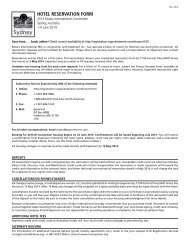로타리안을 위한 프로그램 안내서: 연구단 교환 (GSE) - Rotary ...
로타리안을 위한 프로그램 안내서: 연구단 교환 (GSE) - Rotary ...
로타리안을 위한 프로그램 안내서: 연구단 교환 (GSE) - Rotary ...
You also want an ePaper? Increase the reach of your titles
YUMPU automatically turns print PDFs into web optimized ePapers that Google loves.
SECTION 2<br />
Hosting<br />
HOSTING A TEAM<br />
8 | GROUP STUDY EXCHANGE<br />
If your district is hosting a team from a<br />
Future Vision pilot district, this section may<br />
still apply. Please visit www.rotary.org<br />
/futurevision for more information<br />
on pilot/nonpilot partnerships.<br />
The Host District’s Financial<br />
Responsibilities<br />
All financial responsibilities begin from the<br />
time the visiting team arrives in the host district.<br />
These include<br />
• Meals and lodging for the team<br />
• Internal travel during the tour, including<br />
transport from and to the airport (lowincome<br />
districts should see the <strong>GSE</strong><br />
Internal Travel Subsidy Request Form<br />
on page 43)<br />
• Public accommodations (hotels, motels,<br />
etc.) when necessary or homestays aren’t<br />
available<br />
• Participation in the district conference,<br />
if the <strong>GSE</strong> team will be attending (see<br />
<strong>GSE</strong> District Conference Subsidy Request<br />
Form on page 42)<br />
Publicizing the Program<br />
• Refer to the Guide for Promoting Group<br />
Study Exchange in section 5 (Appendices<br />
and Forms) and at www.rotary.org/gse.<br />
• Send news releases promoting the <strong>GSE</strong><br />
program to leading newspapers<br />
throughout the district.<br />
— Emphasize the educational and ambassadorial<br />
purpose of a <strong>GSE</strong>.<br />
— Specify the country the team will visit<br />
and the time of travel, if it has been<br />
determined.<br />
• Explain that applicants for team membership<br />
should apply through their local<br />
<strong>Rotary</strong> clubs.<br />
• Arrange for speakers at weekly <strong>Rotary</strong><br />
club meetings to promote the program.<br />
Speakers may include past <strong>GSE</strong> team<br />
members and team leaders residing in the<br />
district and <strong>GSE</strong> subcommittee members.<br />
• Network with Rotarians, other local residents,<br />
and international organizations<br />
whose members may have lived in the<br />
country your team will visit.<br />
• Request assistance from Rotarians who<br />
are in advertising or public relations.<br />
• Advise local business, professional, and<br />
other groups that speakers are available to<br />
promote this international opportunity to<br />
potential team members.<br />
Communicating with the<br />
Partner District<br />
• Determine the duration of the visit.<br />
• Reconfirm travel dates and airports for<br />
arrival and departure in the host district.<br />
The <strong>GSE</strong> team must arrive and depart<br />
from the same city in the host district.<br />
Please communicate with your <strong>GSE</strong> coordinator<br />
at the Foundation for authorization<br />
of different arrangements.<br />
• Send information on your district’s<br />
country(ies) to the <strong>GSE</strong> subcommittee of<br />
the partner district. Information on climate,<br />
clothing, customs, etc., is particularly<br />
helpful.<br />
• Check with the sponsor district to see if<br />
the team needs an invitation letter from<br />
the host district to comply with its visa<br />
application process.<br />
• The sending district should provide its<br />
team members’ biographical and vocational<br />
data to the host district at least<br />
three months before the team’s departure.


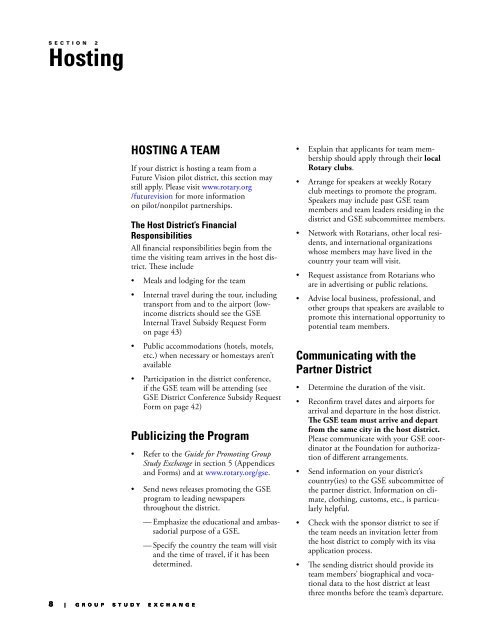
![La présidence du club [222-FR] - Rotary International](https://img.yumpu.com/25855726/1/190x245/la-presidence-du-club-222-fr-rotary-international.jpg?quality=85)

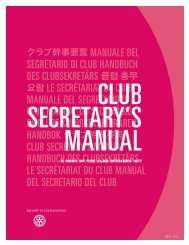
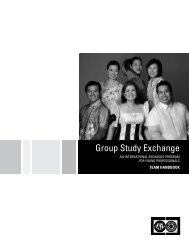
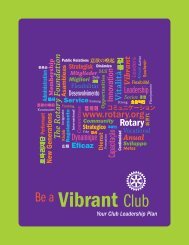
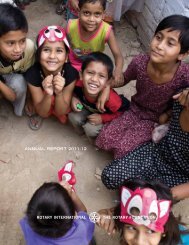
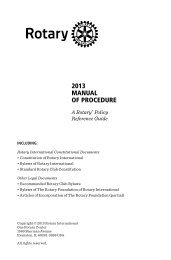


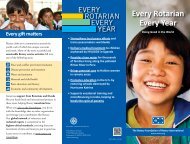
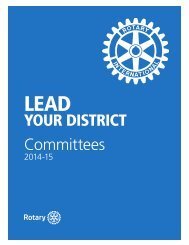
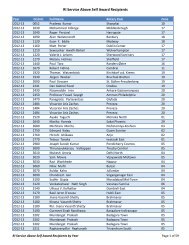
![La conférence de district [800-FR] - Rotary International](https://img.yumpu.com/25855636/1/190x245/la-conference-de-district-800-fr-rotary-international.jpg?quality=85)
